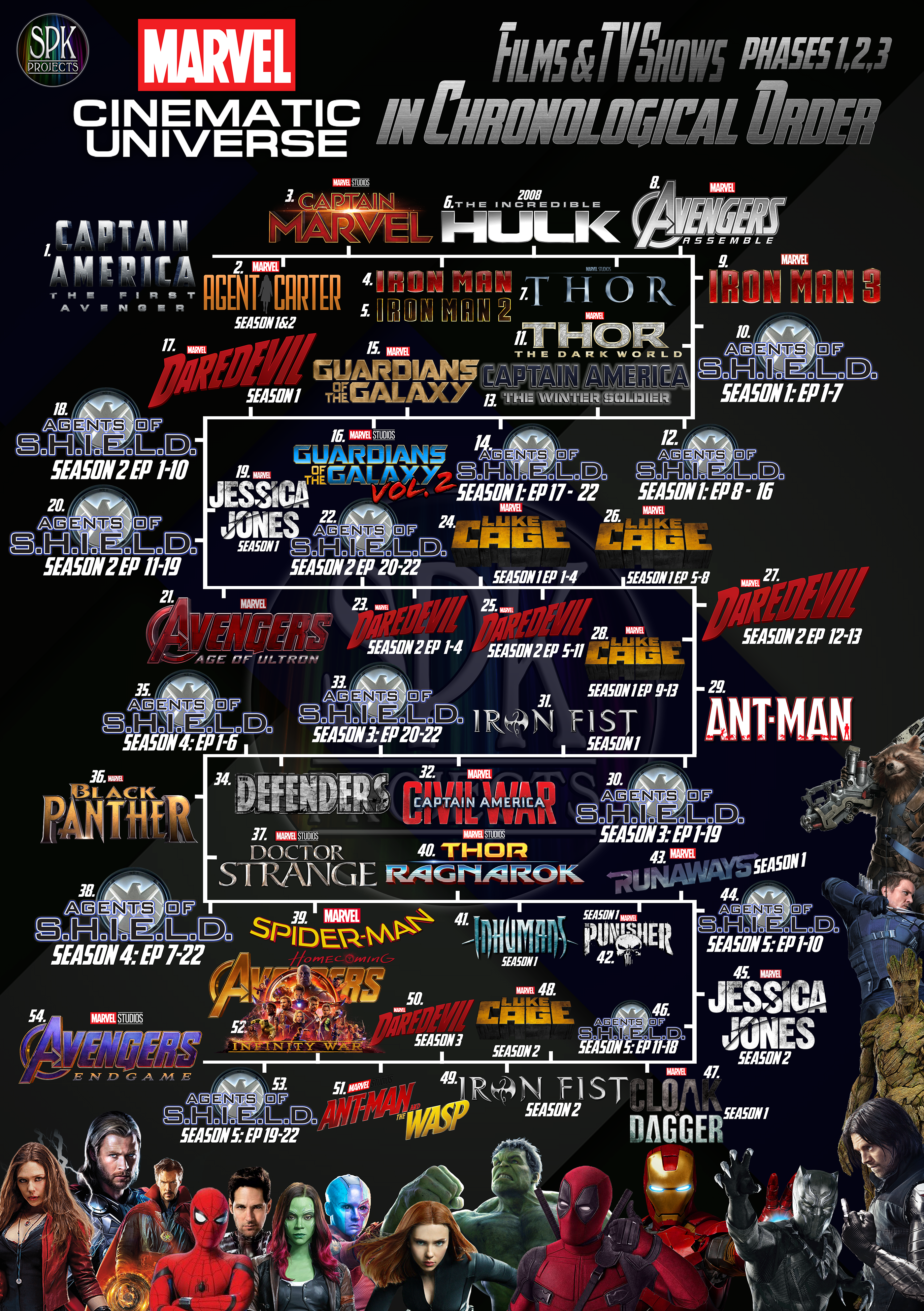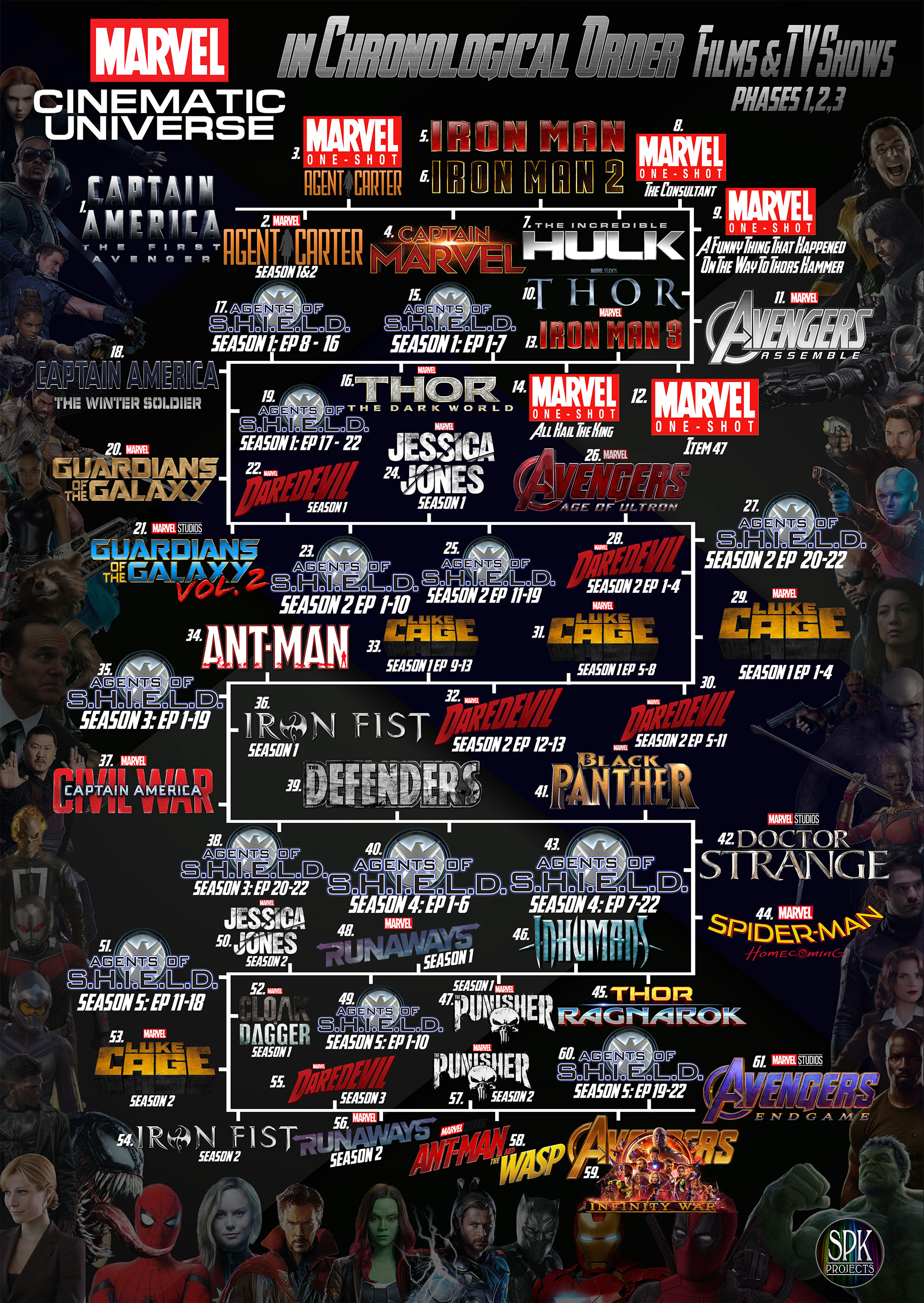Lost in the ever-expanding universe of Marvel films and series? You're not alone, and navigating the intricacies of the MCU timeline is essential for a truly immersive experience. The Marvel Cinematic Universe (MCU) has captivated audiences worldwide, but the sheer volume of content can be overwhelming. From the initial spark of Iron Man in 2008 to the latest multiverse-spanning sagas, keeping track of the chronological order of events is a Herculean task. This article is your comprehensive guide to understanding the MCU timeline, ensuring you experience the stories as they were meant to be told.
Understanding the MCU timeline isn't just about watching movies in a specific order; it's about appreciating the interconnectedness of the narratives, the subtle foreshadowing, and the gradual evolution of characters and plotlines. The order in which the Marvel stories released does not reflect the chronological order that they occurred in. Watching them in release order will spoil many story elements for future movies and make certain events seem out of place. This article will walk you through the chronological order of all the Marvel movies and television shows. The intricate web of interconnected stories necessitates a clear roadmap, and that's precisely what this guide provides. From Captain America's World War II origins to the cosmic adventures of the Guardians of the Galaxy, and the mind-bending complexities introduced by the multiverse, each entry in the MCU builds upon what came before, creating a rich and rewarding viewing experience for those who follow the timeline correctly.
| Aspect | Details |
|---|---|
| Franchise Name | Marvel Cinematic Universe (MCU) |
| First Movie | Iron Man (2008) |
| Most Recent Releases | Ongoing, with new movies and series continually being added. |
| Timeline Complexity | Complex due to flashbacks, time jumps, and multiverse elements. |
| Official Timeline Resource | Marvel Studios' official timeline book |
| Streaming Platform | Disney+ |
| Key Events | Infinity Saga, Multiverse Saga |
| Notable Characters | Iron Man, Captain America, Thor, Spider-Man, and many others. |
| Shared Universe | Films and television series exist in the same continuity, enhancing the interconnected storytelling. |
| Multiverse Introduction | Began with "Loki" series and "Doctor Strange in the Multiverse of Madness." |
The journey begins long before Tony Stark donned the Iron Man suit. The earliest point in the MCU timeline takes us back to World War II with Captain America: The First Avenger. This film lays the groundwork for much of what follows, introducing the Tesseract, the super-soldier serum, and the eternal conflict between good and evil that permeates the entire saga. Following Captain America, the timeline jumps forward several decades to introduce Captain Marvel, set in the 1990s. This film provides crucial backstory for the Kree-Skrull War and establishes Carol Danvers as one of the most powerful beings in the universe, one who will play a significant role in later events. These early stories are foundational, providing context and depth to the characters and events that unfold in subsequent films.
- Diva Flawless Onlyfans Leak Whats Real The Truth Exposed
- Aditi Mistry Nipple Slip The Viral Incident Amp Aftermath
The modern era of the MCU kicks off with Iron Man (2008), the film that started it all. Tony Stark's transformation from a self-centered billionaire to a selfless hero marks the beginning of the Avengers initiative and sets the stage for the interconnected universe that would follow. The Incredible Hulk (2008), released in the same year, introduces Bruce Banner and his alter ego, the Hulk, another key player in the burgeoning superhero team. Iron Man 2 (2010) and Thor (2011) further expand the universe, introducing new characters, new threats, and new dimensions to the MCU. These films are crucial for establishing the dynamics and relationships that would define the Avengers team.
The culmination of these initial films is The Avengers (2012), a landmark event that brought together Iron Man, Captain America, Thor, Hulk, Black Widow, and Hawkeye to defend Earth against an alien invasion led by Loki. This film proved the viability of the shared universe concept and set a new standard for superhero team-up movies. Following The Avengers, the MCU continued to expand with sequels and new franchises. Iron Man 3 (2013) deals with the aftermath of the Battle of New York, while Thor: The Dark World (2013) delves deeper into Asgardian mythology and the threat of the Aether. Captain America: The Winter Soldier (2014) introduces a more grounded and politically charged storyline, revealing a conspiracy within S.H.I.E.L.D. These films demonstrate the MCU's ability to explore different genres and themes while maintaining a cohesive narrative.
Guardians of the Galaxy (2014) marked a significant departure from the Earth-centric focus of the previous films, taking audiences on a cosmic adventure with a ragtag group of intergalactic misfits. This film expanded the scope of the MCU to a galactic scale, introducing new species, new planets, and new threats. Avengers: Age of Ultron (2015) brought the Avengers back together to face a new artificial intelligence threat, Ultron, and introduced new characters like Scarlet Witch and Quicksilver. Ant-Man (2015) added a lighter, more comedic tone to the MCU, while also exploring the concept of the Quantum Realm, which would become increasingly important in later films. These films continued to build the foundation for the Infinity Saga, introducing key elements and characters that would play a crucial role in the final confrontation with Thanos.
- Jaat 2025 Movie Buzz Release Date Cast More Details
- Hdhub4u Is It Safe Your Guide To Free Movie Streaming Sites
Captain America: Civil War (2016) divided the Avengers, pitting Iron Man against Captain America in a philosophical and physical conflict over the Sokovia Accords. This film explored complex moral questions and had significant repercussions for the team, leading to their fragmentation and vulnerability. Doctor Strange (2016) introduced the mystical side of the MCU, delving into the world of magic, sorcery, and alternate dimensions. Guardians of the Galaxy Vol. 2 (2017) further explored the dynamics of the Guardians team and revealed more about Star-Lord's origins. Spider-Man: Homecoming (2017) brought Spider-Man into the MCU, partnering him with Iron Man and introducing a new generation of heroes. Thor: Ragnarok (2017) revitalized the Thor franchise with a more comedic and action-packed approach, while also setting the stage for the destruction of Asgard and the events of Avengers: Infinity War. Black Panther (2018) introduced audiences to Wakanda, a technologically advanced African nation, and explored themes of identity, culture, and responsibility. These films continued to expand the MCU's scope and diversity, introducing new perspectives and broadening the appeal of the franchise.
Avengers: Infinity War (2018) brought together virtually every hero in the MCU to face their greatest threat yet: Thanos, a powerful cosmic being seeking to collect the Infinity Stones and wipe out half of all life in the universe. This film was a culmination of ten years of storytelling, delivering a devastating blow to the heroes and leaving audiences in shock. Ant-Man and the Wasp (2018) provided a lighter counterpoint to the darkness of Infinity War, while also exploring the potential of the Quantum Realm for time travel. Captain Marvel (2019) filled in the gaps in Carol Danvers' backstory, revealing her crucial role in the events leading up to Avengers: Endgame. Avengers: Endgame (2019) concluded the Infinity Saga, with the remaining heroes using time travel to undo Thanos's actions and restore balance to the universe. This film was a monumental achievement, providing a satisfying resolution to a decade-long storyline and setting the stage for the next phase of the MCU. Spider-Man: Far From Home (2019) dealt with the aftermath of Endgame, exploring Peter Parker's grief and his struggle to step into the role of a leader.
The Multiverse Saga began with Phase Four, which introduced the concept of alternate realities and timelines. WandaVision (2021) explored Wanda Maximoff's grief and her creation of a fictional reality, while also introducing the concept of the multiverse through the character of Agatha Harkness. The Falcon and the Winter Soldier (2021) dealt with the legacy of Captain America and the challenges of filling his shoes. Loki (2021) delved deeper into the multiverse, introducing the Time Variance Authority (TVA) and the concept of the Sacred Timeline. Black Widow (2021) provided a backstory for Natasha Romanoff, exploring her past as a Russian spy. Shang-Chi and the Legend of the Ten Rings (2021) introduced a new hero, Shang-Chi, and explored themes of family, legacy, and destiny. Eternals (2021) introduced a new group of cosmic beings, the Eternals, and explored their role in the history of Earth. Spider-Man: No Way Home (2021) brought together multiple versions of Spider-Man from different universes, further blurring the lines between realities. Doctor Strange in the Multiverse of Madness (2022) explored the dangers of the multiverse, with Doctor Strange facing threats from alternate realities. Thor: Love and Thunder (2022) brought back Jane Foster as the Mighty Thor and introduced a new villain, Gorr the God Butcher. Black Panther: Wakanda Forever (2022) dealt with the aftermath of T'Challa's death and the challenges facing Wakanda. These films and series have expanded the scope of the MCU to unprecedented levels, opening up endless possibilities for future stories.
Currently, the Multiverse Saga continues to unfold with new films and series exploring the ramifications of alternate realities and timelines. Ant-Man and the Wasp: Quantumania (2023) further explored the Quantum Realm and introduced Kang the Conqueror, a powerful multiversal threat. Guardians of the Galaxy Vol. 3 (2023) concluded the Guardians' storyline, providing a bittersweet ending for the beloved team. The Marvels (2023) brought together Captain Marvel, Ms. Marvel, and Monica Rambeau, exploring their interconnected powers and destinies. These films are setting the stage for future conflicts and challenges, promising even more epic adventures in the MCU.
To experience the MCU timeline in its entirety, it's essential to follow a chronological order that takes into account the events of each film and series. Here's a suggested viewing order that incorporates all of the major entries in the MCU:
- Captain America: The First Avenger
- Captain Marvel
- Iron Man
- Iron Man 2
- The Incredible Hulk
- Thor
- The Avengers
- Iron Man 3
- Thor: The Dark World
- Captain America: The Winter Soldier
- Guardians of the Galaxy
- Guardians of the Galaxy Vol. 2
- Avengers: Age of Ultron
- Ant-Man
- Captain America: Civil War
- Spider-Man: Homecoming
- Doctor Strange
- Thor: Ragnarok
- Black Panther
- Avengers: Infinity War
- Ant-Man and the Wasp
- Captain Marvel
- Avengers: Endgame
- Spider-Man: Far From Home
- WandaVision
- The Falcon and the Winter Soldier
- Loki
- Black Widow
- Shang-Chi and the Legend of the Ten Rings
- Eternals
- Spider-Man: No Way Home
- Doctor Strange in the Multiverse of Madness
- Thor: Love and Thunder
- Black Panther: Wakanda Forever
- Ant-Man and the Wasp: Quantumania
- Guardians of the Galaxy Vol. 3
- The Marvels
This viewing order ensures that you experience the stories as they unfold chronologically, allowing you to fully appreciate the interconnectedness of the MCU. The order to watch the Marvel movies and shows chronologically is ever-evolving as the MCU continues to release new content. As new films and series are released, the timeline will continue to evolve, adding new layers of complexity and intrigue to the MCU. This makes it all the more important to stay up-to-date on the latest developments and to revisit the timeline periodically to ensure you're experiencing the stories in the correct order.
- Aagmaal Alternatives Unveiling Secrets What You Should Know
- Unlock Math With A Free Online Graphing Calculator Today


